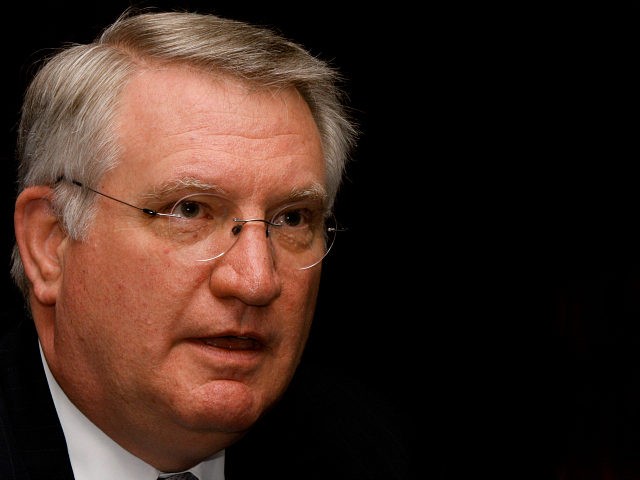John Walters, head of the George W. Bush White House’s Office of National Drug Control Policy (ONDCP) and COO of the conservative Hudson Institute, gave his thoughts on the opioid crises and President Donald Trump’s plan to tackle it on Tuesday’s Breitbart News Daily with Deputy Political Editor Amanda House.
“It’s killing more Americans per year than traffic accidents and murders involving guns combined. … It’s reducing the life expectancy of Americans for the first time in decades,” Walters said of the overdose-strewn opioid epidemic gripping the country.
“Let me call out an agency that has really failed on this, and that is the Centers for Disease Control [CDC] that tracks addiction,” Walters told House. “This is an epidemic. We do not have real-time data. … The CDC was following Zika, Ebola, AIDS and HIV infection. We’re now losing more people than at the peak of the AIDS epidemic.”
“I worked to try to get the CDC involved that didn’t care about the drug problem. It cared about everything else,” Walters recalled. “That’s a failure and it’s intolerable and I’ve talked to some people in the administration about putting some pressure on.”
Commonly known as the president’s “drug czar,” Walters’ position as director of ONDCP made him the top drug policy official in the country, a role he took more than a decade after he served as chief of staff for the first man to hold that position, Bill Bennett under President George H.W. Bush.
“I think it’s excellent. I think he’s trying to do the right thing,” Walters said of Trump’s outline on drugs, announced Monday in Manchester, New Hampshire, with Attorney General Jeff Sessions on hand.
“Obviously huge mass murder is going on in this country,” Walters continued, “We’ve never had over 60,000 deaths … caused by drug overdose, and that’s the tip of the iceberg of addiction and wreckage here. No criminal activity in the history of the United States has ever killed that many people.”
The former drug czar put some of the blame on his successors. “This grew under Obama. … At the end of Bush, drug use was down … now we’ve got people dying in the tens of thousands,” he told House, continuing:
You have to get tough. I started out on this in the Reagan administration with prevention. I know prevention is important, I’ve argued for more treatment money probably than anyone living, but the real key is you’ve got to stop the poison. If this poison continues to pour into our country, we are not going to stop the dying.
The most controversial aspect of Trump’s plan is his willingness to consider the death penalty for certain high-level drug dealers. The proposal set off a flurry of hand-wringing in the left-leaning press despite laws already being on the books prescribing the penalty. Asked if he supported the proposal to use these laws, Walters answered, “Absolutely,” and explained, “First of all, the law is on the books … we’re talking about the very highest level of drug kingpin and the reason is, of course, they’re killing people by sending these poisons into our country.”
Walters saw get-tough measures like the ones Trump is proposing as emulative of his own experience in the 1980s and the tactics used in the war on terror. “These are networks like terrorist networks,” he said of the drug cartels, “you can use mandatory minimums and harsh sentences … this is exactly how we broke down crack rings, this is exactly how we broke down organized crime, this is exactly how we have gone after other criminal network organizations.”
Walters had stern words for naysayers who claim, “Oh this is ridiculous, you can’t arrest your way out.” “They don’t know what they’re talking about. This always works when its applied aggressively and we have this problem because … consciously the Obama administration tore down law enforcement,” he told House.
“Pill mills” and loose prescribing practices played a major role in fueling the opioid epidemic in Walters’s estimation. He explained to House:
These practices can be traced, they need to be followed up quickly. Nobody has to be harmed with pain. There’s a false argument out there that if you go after this you’re going to be making people suffer cruelly. That’s not true. There’s all kinds of legitimate pain medications and people are now coming to … The other part of this is there’s a lot of irresponsible prescribing and people were too casual, and some people are criminals and they need to go to jail.
Walters also noted, with approval, Trump’s linking of the drug crisis with the concurrent crisis on America’s border with Mexico, used to advocate from the president’s signature border wall. “Most of the drugs killing Americans are coming across the southwest border,” Walters said. “The president’s been clear about that from the beginning. He’s absolutely right and we have to do a better job at the border.”
Still, China, through the production and export of synthetic drugs like fentanyl, contributes to the drugs found on America’s streets. Walters suggested efforts to get tough on the rising Asian giant as well. “If they have an incentive to go after these people, they are an authoritarian state. They can find them. They can put them out of business,” he said. “The way to proportionally put pressure on and not cut off our nose to spite our face is to say we’re going to cause you greater cost in shipping, and believe me, they’re going to have to go after it.”
Walters was optimistic about the administration’s leadership on the opioid crisis. “I worked with Sen. Sessions, now Attorney General Sessions; his people are working very hard on this and they get it. Obviously, the president gets it,” he told House. “And that’s the most important thing. We now have a president who gets it.”

COMMENTS
Please let us know if you're having issues with commenting.